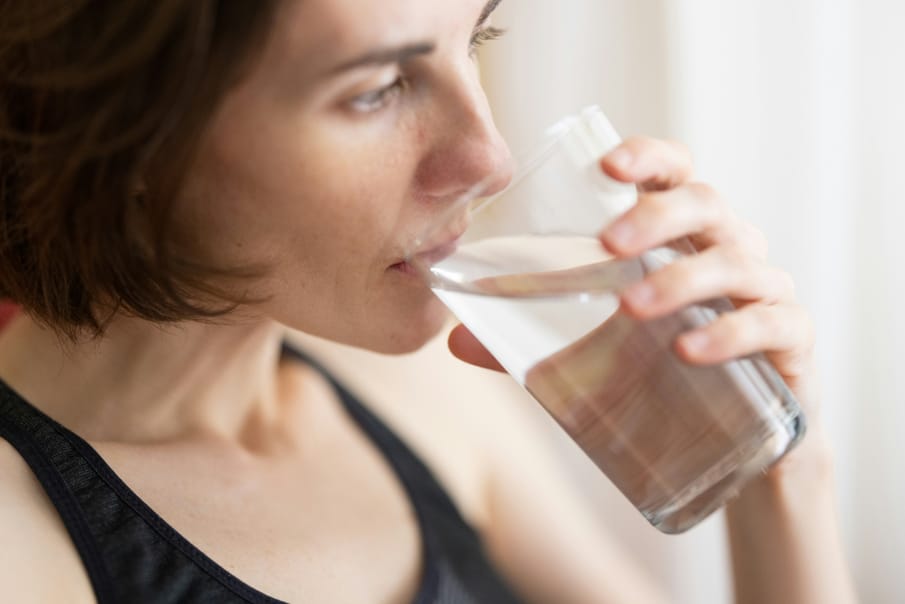We've all heard the advice to drink more water, but why is hydration so important? With our bodies made up of 70% water, staying hydrated is essential for good health and wellbeing. So, why do many of us still fail to drink enough?
What is hydration hacking?
The term ‘hydration hacking’ refers to a deliberate, mindful approach to increasing your body's water intake in order to maximise health benefits, taking into account factors such as water quality, electrolyte balance, and consumption timing. Hydration hacking has numerous benefits, including increased energy, skin health, digestion, and cognitive function.
Nutritionist Uta Boellinger says, “Good hydration is crucial for health and wellbeing, and just about every mechanism in your body relies on adequate water intake.” Here, we share simple tips for fast-tracking your hydration levels.
Track your water intake
Most of us know the importance of drinking water but timing your water consumption is a useful hack for ensuring you stay hydrated throughout the day. Small habits such as reaching for water first thing in the morning can help to increase metabolism and replenish fluids lost when sleeping, whilst drinking a glass of water before a meal can help to support digestion and aid in weight management. Apps such as WaterMinder, Hydrocoach and Waterlogged are great tools for tracking water intake.
Add electrolytes
Electrolytes are minerals like sodium, potassium, and magnesium that help the body keep fluid balance. To replenish minerals lost in your water, try adding a pinch of sea salt or a scoop of electrolyte powder. While water is the most effective method of staying hydrated, other hydrating drinks can provide additional health benefits, for instance, coconut water is high in electrolytes, while herbal teas contain antioxidants and other health-promoting compounds.
Consider your water quality
The UK has high standards for its mains water supply, but that doesn't mean it meets everyone's personal preferences. Not all water is equal, and the quality of the water you drink can have a significant impact on your health.
In her article, 'The health benefits of water demystified,' nutritionist VJ Hamilton explains, “With tap water, you are at risk of consuming antibiotics that are lurking in the water, as well as the damage that the added fluoride can have on your health - particularly for those with thyroid issues. So, from a health perspective, glass bottled water is best, but if that’s a cost too far, investigate the various water filter options available. A proper water filter should get rid of most of the nasties from tap water.”
Set reminders throughout the day
Another idea to help you remember to drink water is making associations throughout the day. If you enjoy tea or coffee, why not fill up a glass of water every time you make a hot drink? If you find yourself scrolling through social media, take a few sips! Find whatever works for you and get into the habit of relating normal daily practices to prompt you to stay hydrated. You may also want to consider purchasing a high-quality reusable bottle; having a large water bottle by your side will serve as a regular reminder to drink up!
Incorporate hydrating foods
Lots of fruit and vegetables are also great sources of water. In fact, around a fifth of our daily fluid intake comes from the foods we eat. Many fruits and vegetables such as watermelon, cucumber and celery have high water content and can contribute to overall hydration. If you want to switch up the flavour of your water, you can add cucumbers and fruits. These foods contain added vitamins and minerals for extra nutrition, so it's a win-win.
In her article, 'Top foods to beat fatigue,' nutritionist Ailsa Hichens says, “Watermelon and cucumber aren’t often feted as nutrient-dense foods but, as far as we’re concerned here, they play a big role due to their water content. Dehydration is one of the biggest causes of fatigue, and these guys have a high water content, so you’re getting satisfaction from your food with the added benefit of a drink, too.”
Pay attention to dehydration
Paying attention to your hydration levels can help you recognise any signs of dehydration and take proactive steps to rehydrate before it becomes a problem. Look out for signs of thirst such as urine colour (if you’re well hydrated, the colour of your urine will be a pale yellow, dark urine is a sign you need more water).
Don’t forget to consider energy levels, too. Nutritionist Uta Boellinger says, “If you’re feeling tired and struggling to concentrate, it can be a sign of dehydration. And your skin is also a good indication, especially dry, cracked lips which signal a lack of hydration.”
Drinking more water, like other healthy practices, is a habit that often takes time to develop. If you would like to get more advice on water consumption or learn how to ensure you are getting optimum nutrition, then a nutritionist may be able to help. At Nutritionist Resource you can find a nutritionist near you.


Comments